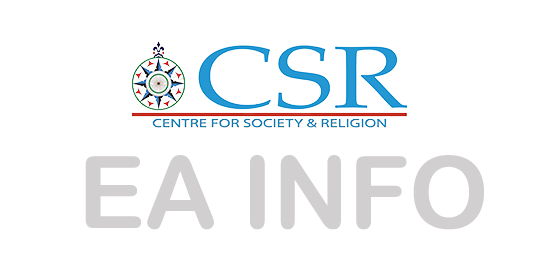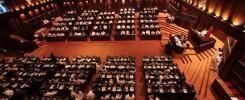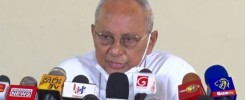By Kalyananda Tiranagama
The Presidential Commission of Inquiry on Easter Sunday Attack (PCoI) had the difficult and challenging task of going through a vast amount of evidence, both oral and documentary, of several hundred witnesses, identifying the persons and organizations involved in the attack and the circumstances that brought about the situation culminating in the attack, and the political leaders and state officials whose dereliction of duty and responsibility resulting in the failure to take necessary action to prevent the attack in time and making necessary recommendations for taking legal action against them and for preventing recurrence of such situations.
In its Final Report submitted to the government, the PCoI had made a large number of relevant, important, useful and implementable recommendations, some of which the government has already taken steps to implement such as arresting some of the persons and proscribing some organizations mentioned therein. The Commission has done a commendable job by presenting this report.
While the Commission was conducting its inquiries summoning witnesses and recording their evidence at length giving wide publicity through the media, the people of the country expected that the Commission would identify all the culprits responsible for the attack, not only those who carried out the terrorist acts, but all those who were involved in or contributed to it directly or indirectly in various ways by facilitating, aiding and abetting, providing financial, material or moral support, within the country and from outside, to the terrorist group that carried out the attack; the links they had with communalist Muslim political parties and their leaders; and the foreign involvements in the attack. The people also expected it to identify the political leaders and public officials accountable for this attack by their failure to take necessary action to prevent it even after having received information in advance and deal with them according to law.
However, when a person with some legal background reads this report with an analytical mind, one finds that there are several incomprehensible lapses, omissions and lacunae in it. The purpose of this article is to point out some of the lapses that one would come across while going through this report.
Persons directly connected to terrorist attacks
In its Final Report the Commission has identified 14 persons as persons directly connected with the terrorist acts that took place on Easter Sunday. Out of them 11 persons are dead:
Zaharan and Ilham Ibrahim – suicide bombers in Shangrila attack;
Inshaf Ibrahim – Cinnamon Grand bomber; Mubarak – Kingsbury bomber;
Jameel – Dehiwala Tropical Inn bomber; Muath – Kochchikade bomber;
Hasthun – Katuwapitiya bomber;
Azad – Batticaloa Zion Church bomber;
Rilwan, Shaini and Niyas – died in Saindumarudu explosion.
Only three persons remain in custody to be prosecuted:”
(i)
Mohammed Ibrahim Mohammed Naufer – who has lectured on IS ideology and its activities in all the training camps conducted by Zaharan group;
(ii) (ii) Hayathu Mohammadu Ahamadu Milhan – who has acted as the weapons trainer in about 12 training camps conducted by Zaharan, played a key role in establishing the training camp at Wanathavilluwa and preparing explososives and procuring chemicals for the manufacture of bombs and taken part in the killing of two Police officers at Vavunativu in November 2018.
(iii) (iii) Mohomed Ibrahim Sadeeq Abdulla – an active member of Jamaath Islamia Students Movement (SLJISM), who had gone to Syria via Turkey in 2014 and undergone arms training; and participated in two training camps conducted by Zaharan and conducted some more camps in 2017 and 2018 on his own.
Persons and Organisations that contributed to terrorist acts
The PCoI has identified
the following as organizations and persons that contributed to the terrorist attacks by aiding and abetting actions which caused racial and religious disturbances or by giving support to such acts within the country and created public unrest and disturbed social order:
(i) Sri Lanka Jamaat-e-Islami (SLJI)
SLJI is an organization working on the same ideology as Muslim Brotherhood, a terrorist organization banned in Egypt, and having close connections with persons and organizations having the same ideology in Egypt, Saudi Arabia, Kuwait, Qatar, India and Pakistan. The final goal of the SLJI is establishment of an Islam state in Sri Lanka. The official publication of SLJI, Al Hassanat has over the years carried articles glorifying jihad. In February 1990 it has published an article stating that the establishment of an Islamic state cannot be done without waging jihad. In November 1999 it has carried an editorial criticizing the worshipping of statues and praising those who break them. In February 2001 it has published an article extolling people who sacrifice their lives for Islam and stating that they will be given 72 virgins in heaven. In June 2008 it has stated quoting Egyptian terrorist Al Qardawi that a suicide attack is a great act of jihad. It has established Arabic Schools in Madampe, Mawanella and Kalkudah. At the Arabic School in Madampe students were taught about the establishment of an Islamic state and it was compulsory to learn to fight with weapons – P. 227 – 228.
(ii) Sri Lanka Jamaat-e-Islami Students Movement (SLJISM)
SLJISM is the students’ wing of the SLJI. Many of the participants in training programmes conducted by Zaharan and several of the suspects in custody over the Easter Sunday attacks are members of the SLJI. About 15 members of the SLJISM are in custody over the Easter attack, some of them have gone to Syria for arms training and Mufees, the person who provided the land at Wanathavilluwa where explosives and weapons found was a member of SLJISM. – P. 238
The COI has recommended proscription of SLJI and SLJISM.
Persons:
(i) Ahamed Talib Lukman Thalib (father);
(ii) (ii) Lukman Thalib Ahamed (son) – 2 persons of Sri Lankan origin domiciled in Australia –who have facilitated several members of SLJISM to proceed to Syria via Turkey for arms training;
(iii) (iii) one Rimsan, a Sri Lankan connected to Al Qaida. The COI has recommended in the on-going criminal investigations to examine their role, if any, in the Easter Sunday attacks.
(iv) Rasheed Hajjul Akbar – the leader of SLJI from 1994 till August 2018. He was a member of the Shura Council of the SLJI. Hajjul Akbar is one of the main ideologists of Islamic extremism in Sri Lanka, promoting religious hatred and intolerance, application of Sharia law and establishing an Islamic state in Sri Lanka. Under his leadership, the official journal of SLJI Al Hassanat has published articles promoting extremism and terrorism. He had been arrested by the CCD on August 25, 2019 and released on September 27, 2019. His younger brother is Moulavi Rasheed Mohamed Ibrahim. Moulavi Ibrahim and his two sons Sadeek Abdulla and Shahid Abdulla are in custody for damaging Buddha statues in Mawanella in December 2018. The COI has recommended the AG to consider instituting criminal action against Rasheed Hajjul Akbar for conspiring to establish an Islamic state in Sri Lanka.
(v) Dr. Muhamad Zufyan Muhamad Zafras – working at the National Hospital, Colombo who has helped Zaharan’s brother Rilwan to get admitted to Colombo National Hospital for treatment as a person injured in a gas cylinder blast, hiding the fact that he was injured in a blast while experimenting with explosives. The COI has recommended the AG to consider instituting criminal action against Dr. Zafras under S. 5 of the PTA for withholding information.
Accountability of Authorities for Failure to Prevent Attacks
Political Authorities
As for the political authorities in government accountable for the failure to prevent the terrorist attacks, the PCoI has found only President Maithripala Sirisena accountable: President Maithripala Sirisena – failed in his duties and responsibilities, transcending beyond mere civil negligence – P 263. There is criminal liability on his part for the acts or omissions mentioned therein and the COI recommends the Attorney General instituting criminal action under the Penal Code against him. -P 265
Senior Public Officers
The COI has recommended the AG to consider instituting criminal action under any suitable Penal Code provision against three senior public officers:
(i)
Secretary Defence Hemasiri Fernando – P. 284;
(ii)
DIG Sisira Mendis, Chief of National Intelligence – P. 285;
(iii)
SDIG Nilantha Jayawardane, Director, State Intelligence Service – P, 288.
Law Enforcement Officers
Out of the Law Enforcement Officers held accountable by the PCoI for their failure to take necessary steps to prevent the attacks in their respective areas, recommendation has been made only against the Inspector General of Police Pujitha Jayasundara for the AG to consider instituting criminal action under any suitable Penal Code provision. – P. 308
In respect of 6 other Police Officers recommendation has been made for the AG to consider instituting criminal action under any suitable Penal Code provision or S. 82 of the Police Ordinance. The following Police Officers belong to this category:
(i)
SDIG Nandana Munasinghe – Western Province – P. 312;
(ii)
SP Sanjeewa Bandara – Superintendant of Police, Colombo North – P. 314;
(iii)
SSP Negombo – Chandana Athukorala – P. 315;
(iv)
SP B. E. I. Prasanna, Western Province Intelligence Division – P. 315;
(v)
Chief Inspector Sarath Kumarasinghe, Acting OIC, Fort Police Station – P.320;
(vi)
Chief Inspector Sagara Wilegoda Liyanage, OIC, Fort
The AG has the option of instituting criminal action under any suitable Penal Code provision or under S. 82 of the Police Ordinance. If the AG decides to institute action under S. 82 of the Police Ordinance, they will not be indicted and there will be no criminal proceedings against them. They will be charged in the Magistrate’s Court for breach of duty under S. 82 of the Police Ordinance:
–
S. 82 :– Every Police officer (a) guilty of any violation of duty or wilful breach or neglect of any regulations and lawful orders of other competent authority – shall be liable to a penalty not exceeding three month’s pay, or to imprisonment with or without hard labour, for period not exceeding three months, or both.
Against three other Police Officers only disciplinary inquiry has been recommended:
(i)
DIG Deshbandu Tennekone, Colombo North;
(ii)
Negombo ASP Sisila Kumara;
(iii)
Chaminda Nawaratne, OIC, Katana
Accountability of Prime Minister Ranil Wickremasinghe and the Cabinet of Ministers
As for the responsibility and failures of the Prime Minister Ranil Wickremasinghe no such recommendation, as made against the President, has been made.
It appears from the following observations of the PCoI that it has shown a very lenient attitude towards the failures of the Prime Minister. The report states: ‘The reasons for the Prime Minister Ranil Wickremasinghe’s inability to attend meetings of the National Security Council when fixed at short notice due to other commitments – acceptable; Though he did not explain why he did not stay on for some of full meetings, this taken in isolation is insufficient to make any adverse findings against him – P. 268; There are other instances reflecting lenient approach on his part to national security issues: No positive action taken to prevent Wahabi violence against traditional Sufi Muslim community though he was aware of it; Did not accept army intelligence presentations about the rising Islam extremism in the country, particularly in the East – P. 270; He opposed the issue of banning nikab and burkha raised by the Army Commander at the National Security Council without consulting Muslim parties – P. 271; Govt. did not ban IS organization in Sri Lanka as there were no reports stating IS propaganda taking place in Sri Lanka, only reports of individuals spreading IS ideology; It was corroborated by several witnesses that the Govt was reluctant to take strong action against rising Islamic extremism due to its dependence on support of Muslim political parties.’
However, the Report states: ‘The lax approach of the Prime Minister towards Islam extremism was one of the primary reasons for the failure on the part of the government to take proactive steps towards Islam extremism. This facilitated the build-up of Islam extremism to the point of Easter Sunday attacks.’ – P. 277
– If it is so, why no action is recommended against Prime Minister Ranil?
– It has totally ignored the fact that, though Maithripala Sirisena was the President, the Prime Minister Ranil Wickremasinghe had the effective control of the entire government in his hands under the 19th Amendment, controlling the Cabinet and the Parliament.
– Sagala Ratnayake, a close confidante of the Prime Minister in the UNP, was the Minister of Law and Order in charge of the Police.
The Accountability of the Cabinet of Ministers
The PCoI has not given its mind as to whether the Cabinet of Ministers has contributed in any manner to the terrorist attack by its failure to discharge its Constitutional responsibility. When it examined the accountability of the President and the Prime Minister, one finds it difficult to understand why it did not examine the accountability of the governemtn headed by the Cabinet of Ministers, especially in view of the relevant provisions in Article 42 of the Constitution and the evidence placed before it.
Article 42 (1) There shall be a Cabinet of Ministers charged with the direction and control of the government of the Republic;
(2) The Cabinet of Ministers shall be collectively responsible and answerable to Parliament;
(3) The President shall be a member the Cabinet of Ministers and shall be the Head of the Cabinet of Ministers.
IGP Pujitha Jayasundara sent the communication received from Senior DIG Nilantha Jayawardana, Head of the State Intelligence Services and from Sisira Mendis, the Chief of National Intelligence containing detailed information warning about a threat of possible terrorist attack by ISIS terrorists in Sri Lanka received from Indian Intelligence sources with a note stating ‘FNA’ on 09. 04. 2019 itself to four Senior Police Officers: i. SDIG Western Province – Nandana Munasinghe; ii. SDIG Crimes, Organized Crimes and STF – M. Latheef; iii. SDIG Special Protection Range – Priyalal Dasanayake; iv. Director – Counter Terrorism Investigation Division – Waruna Jayasundara – P. 303.
Special Protection Range is the Ministerial Security Division (MSD) which provides security to Ministers of the Cabinet. It was reported in the media that SDIG Priyalal Dasanayake, giving evidence before the Commission, stated that he had conveyed the information received of the threat of possible terrorist attack to all the officers of the Ministerial Security Division on April 9, 2019 itself.
Of the four Senior Officers who received the said communication from the IGP, the PCoI has recommended to the AG to consider instituting criminal action under any suitable Penal Code provision or S. 82 of the Police Ordinance against SDIG Western Province – Nandana Munasinghe;. – P. 312. As for the conduct of SDIG Crimes, Organized Crimes and Commander STF – M. Latheef, the Report contains the following comment: ‘When the COI queried the steps taken with regard to it (the IGP’s communication) the response was that he got in touch with the Indian High Commission and provided security to it. However, it is surprising as to why he did not instruct his intelligence units to work on the intelligence received.’ – P. 309. No recommendation made against him.
However, the final report does not mention anything about the steps taken by SDIG Priyalal Dasanayake on the information conveyed to him. It does not show whether COI made any query as to whether the officers of the Ministerial Security Division conveyed the information received by them to the Ministers to whom they provide security and the reaction of the Ministers concerned. This is highly relevant and a serious lacuna in the report. One cannot expect or believe that none of the officers of the Ministerial Security Division conveyed this information received by them to any of the Ministers. At least we know that Minister Harin Fernando’s father had got this information from a Police officer, and that he conveyed it to his son preventing him from going to church on that fateful day.
The entire Cabinet of Ministers cannot evade responsibility for their failure in their Constitutional duty. Though they may not be legally accountable, their conduct is highly irresponsible, immoral and blameworthy.
However, the Cabinet Sub-Committee appointed by the present government to study the Report of the COI and identify recommendations for implementation has also expressed its view that the entire government then in power was accountable for the failure to prevent the Easter Attack.


